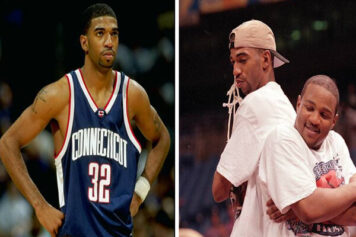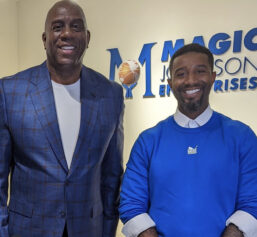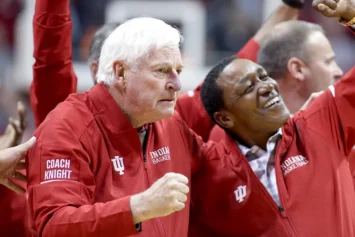Serendipity. The word means a fortunate happenstance or a pleasant surprise. And it was indeed a serendipitous moment that led Gus Johnson, the most electrifying, dazzlingly authentic and dynamic sports play-by-play announcer working today, into the field of broadcast television.
Johnson’s signature work, thus far, has been the masterful verbal gymnastics that he employed to great effect while employed by CBS Sports to make the NCAA Men’s Basketball Tournament, America’s greatest sporting spectacle, even more compelling and enjoyable. When Gus was assigned a game in the tournament, whereas most announcers are practically irrelevant, his infectious humor, intelligence and unique delivery warranted turning the volume up.
Today, he currently handles the microphone for Fox Sports and the Big Ten Network, handling everything from college basketball and football to, very soon, World Cup soccer.
As a student pursuing his undergraduate studies at Howard University, Johnson, a four-year letter winner on the baseball team, was confused about what career path to pursue.
He toyed with attending Law School immediately after receiving his Bachelor’s Degree, and harbored visions of passing the Bar Exam and becoming a prominent defense attorney. But after spending a day shadowing a lawyer, a mentor from his younger days at the Boys Club in his hometown of Detroit, Johnson returned home with a sincere understanding that a Juris Doctorate and replicating Perry Mason’s mastery of the closing argument were no longer viable options.
Johnson balked at the glacier-like pace of court proceedings and mounds of paperwork that lined the walls of his mentor’s office in bland boxes. The exuberance of his personality, excitement and fulfillment that he craved were not harmonious with the tedious and boring day he’d just experienced. He confided in his mother, after his shadow day, that being a lawyer no longer appealed to him.
“Whatever you do in this life as your job,” his mom presciently told him, “make sure that you’ll jump out of bed in the morning to do it, even if it only pays you enough to meet your bills.”
Johnson returned to Howard’s campus that fall with a sense of urgency, in search of his calling. Little did he know that serendipity would soon change his life’s trajectory, and the future enjoyment of many sports fans as well, in the span of a mere few hours.
But prior to that one interaction, some forces had already coalesced to prepare Johnson for what lied ahead. He wasn’t quite aware of it yet, but he’d been practicing and honing his future craft from his earliest of days.
HUMBLE BEGINNINGS AND EARLY PREPARATION
Gus Johnson was born, in a sense, into the business of sports. His father worked in the facilities and maintenance department at Cobo Hall, the Detroit Pistons home arena from 1961 to 1978, before the NBA team abandoned the city to play at the Pontiac Silverdome.
“He started off laying the floor and putting up the goals,” said Johnson. “I remember going down there and it was just magical because, first of all I was with my father, and anything you do with your dad, from small to big, is huge. Back then, the Pistons weren’t a great team, but I got a chance to sit as close to the floor as I could. Detroit is a basketball town. We love our game. The Pistons were the centerpiece of our basketball community.”
“At a very early age, trying to stay positive and focused and not be distracted by some of the trappings of life in the inner city, [watching the Pistons] gave me something to dream about, to think about, to practice, and to make me a better person,” Johnson continued. “I think that’s what Daddy gave me at an early age.”
There was a separate Motown athletic institution that was equally transformative in the life of young Gus: the legendary St. Cecilia’s Church’s sports programs.
He played football and basketball for Sam Washington, the man known as “The Godfather of Detroit Basketball” who used the accelerant of police brutality and one of the worst riots in American history in 1967 to establish what would one day become the most hallowed hoops institution in all of Michigan.
Washington figured that the best place for the neighborhood kids to be during the tumult was inside of St. Cecilia’s gym.
“My dad had the keys to the gym, so he figured the best thing to do was to open it up and let us play all day,” Sam Washington Jr. recently told Grantland.
Washington, Sr., as Johnson’s sixth grade hoops coach, once told the young player something that continues to resonate with him today.
“I drove by somebody, he stopped practice and said, ‘Look, I want you to remember something for the rest of your life. You got a quick first step. You’re slow as molasses, but you can get by people. Remember that,’” said Johnson. “That’s kind of an analogy for my life right now. I got a quick first step. I’ll get by you if you sleep on me. That’s how I go into the profession I’m in now. It’s not an easy profession and you have to focus on what you do well.”
Johnson marveled at some of the players that he watched playing serious games in the cramped St. Cecilia’s gym, on the small, congested court where one out of bounds demarcation is actually an unforgiving brick wall.
As a young sports junkie, he watched with glee as players like Dave Bing and George “The Iceman” Gervin ferociously battled for nothing more than local bragging rights.
“St. Cecilia’s was some serious competition,” said Johnson. “You could lose a tooth, you were gonna get fouled hard, guys were going to press and trap, knock down mid-range jumpers and post you up, all the things that it takes to win the game. And dudes were in there betting on the games, so it wasn’t a game. I remember seeing Scott Skiles and Sam Vincent. Isaiah [Thomas] used to play there when he wanted to get loose. Magic [Johnson] would come all the way from Lansing!”
“Those were some of the best days of my formative years,” Johnson continued. “I don’t think that I would be here, I don’t think that I would have had the impact on basketball in my profession without Coach Washington and the St. Cecilia’s brand.”
Another contributing factor to what Gus Johnson would eventually blossom into professionally was a young basketball coach at the University of Detroit in the mid to late ‘70s named Dick Vitale. Dickie V would later become college basketball’s hyperbolic voice of enthusiasm as a color analyst on ESPN as the network transitioned from fledgling upstart to the ‘Worldwide Leader in Sports.’
Johnson was a ‘Titan Toddler’, and a huge supporter of the hoops program at the school that some of his family members attended.
“That was a whole movement in Detroit when Coach Vitale came,” said Johnson. “We had never seen anything like that in Detroit, this man with this boundless energy, this swagger, this verbal ability to get you on his side, his charisma. And he was saying all that stuff back then – ‘I got a P.T.P.’er, he’s a high-flyer, oh! We’re gonna get a nosebleed!’ We just sucked it up. He came to my Boys Club banquet, spoke, and I had a chance to meet him and take a picture with him. Looking back on it, he was so charismatic and you wanted to be around him. You wanted to touch him.”
Despite being in television and sports media for 25 years, and his current status as one of the brightest stars in the business, Johnson hasn’t had the opportunity yet to talk to Vitale and thank him for that early spark and influence. It’s something that he’s excitedly looking forward to one day.
The Boys Club, on Livernois and Michigan Avenues, was another critical element in his early development. His mother would drop him off and young Gus would elatedly scamper inside to play hoops, baseball, football and any other athletic opportunity that was offered.
She also recognized his talent as an orator, and insisted that he enter oratorical contests that the Boys Club offered.
“A mother knows her child,” said Johnson. “She saw that the Boys Club sponsored oratorical contests and was like, ‘You’re getting into this.’ I didn’t want to do it to be honest with you.”
The first time he participated, he won. The next year, thinking that his mother was unaware of it, Gus was gleefully playing baseball when his mom walked up and pulled him off the field.
“All of a sudden, I’m on the baseball diamond playing, and here comes my mother walking onto the field,” said Johnson. “She was carrying a Boys Club t-shirt and shorts and said, ‘Put these on, sit at those picnic benches and write a speech. You got 20 minutes and then you’re gonna go in there and deliver this speech.’”
When Johnson pleaded with his mother, telling her that he didn’t want to do it, she insisted by saying, “You’re doing it. Period! You need to always be good on your feet.”
He proceeded to win the contest again. The executives at the Boys Club recognized his communication skills and began harnessing them, providing opportunities for him to stand in front of large audiences while delivering speeches.
“Momma, she knew something,” said Johnson. “It all began at the Boys Club. And when I was coming out of high school and applying for colleges, I would check the boxes of things I thought I wanted to study, like law or medicine. I would give her my applications to send off, and she’d always check off the box – Communications. She was responsible for my ability to talk to people.”
When he returned to Howard University for the fall semester after deciding that becoming a lawyer did not interest him, he struck up a conversation with Glenn Harris, a former baseball player at the school who was working as a local sports anchor. He asked Harris about his job as an on-air sports commentator and personality.
“I love it,” Harris replied. “It’s a great job. It changes every day, especially if you love sports.”
Harris mentioned, during that conversation, that it just happened to be his intern’s last day. Johnson proceeded to walk into WHUR, applied for the internship and was hired on the spot.
“It paid $500 for the semester, which was a lot money for a college student back then,” said Johnson. “Our student radio station was right down the hall. I said, because I was going to be writing and preparing Glenn for his shows every day, well maybe I should get on the air, even if it’s just the student station, and get some experience to learn. So, in two hours, my life was different.”
Johnson hungrily jumped into his new work and cut his teeth doing play-by-play for the Howard University men’s and women’s basketball teams.
“Sometimes, something settles in you,” Johnson continued. “It’s like a voice says, ‘OK. This is it! Let’s be serious. Go for it!’ And that’s what happened that day and over the next two years as I finished up my college education and finally got focused on, ‘OK, this is what I want to do. And I think I can be good at it.’”
TO BE CONTINUED…PART II



